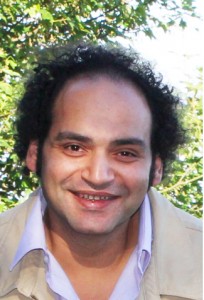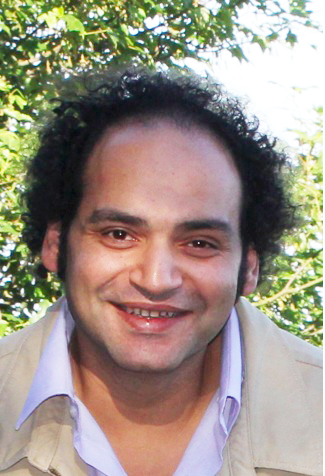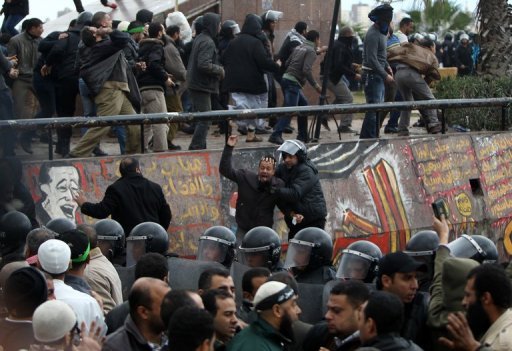 The crisis that broke with Morsy’s constitutional declaration on 22 November reconfigured the political scene in Egypt. The map of political forces has changed a lot in this past month. Inside the opposition camp, a new alliance formed between liberals, leftists and conservatives to create the National Salvation Front.
The crisis that broke with Morsy’s constitutional declaration on 22 November reconfigured the political scene in Egypt. The map of political forces has changed a lot in this past month. Inside the opposition camp, a new alliance formed between liberals, leftists and conservatives to create the National Salvation Front.
Inside the state’s camp, the Muslim Brotherhood has bluntly announced its multi-dimensioned support to President Mohamed Morsy, which extends to physical confrontation with those who oppose him.
The Salafis have offered their political and ideological support to the president. Politically, they are using Al-Nour party as a front for support and ideologically, they are mobilising people in the name of religion via mosques and satellite channels.
Meanwhile, the crisis has introduced a loose cannon to the scene, which seems to be doing the dirty work of other political and religious groups, the disqualified presidential candidate Hazem Salah Abou-Ismail.
In the middle of this political mess, questions started to be asked about the position of the army. Some dreamed about a January-like scenario where the army would step in to overthrow the president. Others feared the nightmare of being thrown out of Morsy’s frying pan and into the army’s fire.
Yet others simply asked the logical question, where does the army fit in all this? It is a logical question because since 1952 the army has either been the executive branch of the state or (more recently) maintained a firm grip on the executive branch through the president and other army personnel scattered in various executive positions. But since Morsy was declared President, the army has lost its direct involvement in the executive branch. Does that mean that the army is out of politics as Morsy, the Brotherhood and the army generals like to claim?
The current crisis demonstrates that the army is indeed into politics, and still is a major player in political decision-making in Egypt. However, the army is clearly assuming a different role than the one it has played for the past 60 years. Instead of the army being the direct actor on the scene, it has taken a step back and decided to be the guardian and guarantor of fundamental interests.
Those interests are ones that directly affect the army and ones that the army has no intention of giving up. As long as domestic political turbulences do not threaten those interests, the army will remain neutral. At the moment, those interests are best served by the army’s position in the new constitution, which allows the army to overlook its direct and fundamental interests without being directly involved in the executive.
The new constitution does not make the army’s budget public. Article 197 states that the army’s budget is only to be discussed inside the National Defence Council, which is made up of a majority of army personnel. The same article states that this council is to be consulted on all laws related to the armed forces.
Article 197 allows the army to dominate its own realm through economic and legislative means. Article 198 allows military courts to put civilians on trial for crimes that harm the armed forces (without specifying what those crimes are). By virtue of this article, the army has the authority to decide who poses a threat to it and at the same time take the necessary coercive measures through military tribunals unchecked by any other authority.
Through this article, the army has secured itself from domestic criticism. Finally, article 146 does not allow the president to declare war or deploy units of the armed forces outside Egyptian territory except after consulting the National Defence Council. In the previous constitution of 1971 (article 150), the president was allowed to declare war in his capacity as supreme commander of the armed forces after the parliament’s approval. The new constitution included the National Defence Council in the process.
The position of the army in the new constitution makes it directly responsible for its internal policies and economy, safeguards it from political opposition and criticism and makes it a major actor in all decisions that relate to regional order and stability that in turn might threaten the overall interests of the army.
The army did not openly take any sides in this crisis because neither side threatened the army’s interests. In fact, the army’s participation in securing the referendum and its ongoing preaching for stability and dialogue reflect the army’s will to pass the new constitution that serves all its interests.
This does not necessarily mean that the army has a strategic alliance with the Muslim Brotherhood; it rather means that both the Brotherhood and the army have a mutual balance of interest where they equally serve each other. The army on one hand turns a blind eye to political tension and refrains from direct involvement in the executive; and on the other hand, the Brotherhood drafts a constitution that secures the army from any civil intrusion.
The army did not withdraw from politics; it simply decided to have political forces take care of the army’s interests in exchange for the army’s consent on the domestic administration of the country. The army will never be a safe exit from the crisis; it is a genuine part of the problem.




